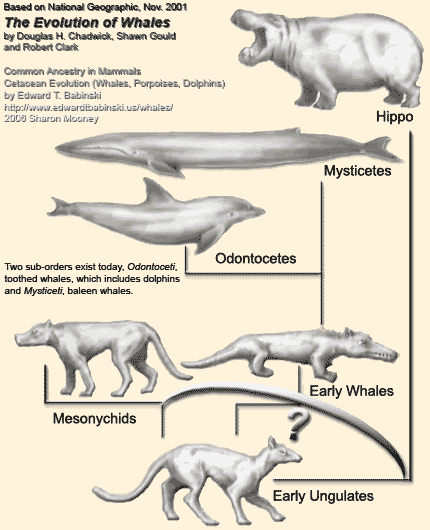What got me interested in Aquaculture and Marine Biology
The Evolution of Whales
I've had the rare opportunity to correspond and actually (somewhat unofficially) collaborate on a few articles, with one of the world's foremost experts on early whales (Darn right I'm proud of that), Dr. Hans Thewissen, (as you can see to the left of the blog), he's written "The Emergence of Whales" and editor of the Encyclopedia of Marine Mammals, both of which I now have in my library.
I received the National Geographic, Evolution of Whales article in November 2001, and from there developed enthusiasm over early whales and whale origins. The article included comments about whalers finding whales with leg remnants. We (myself and Edward T. Babinski) went about tracking down the journals which featured photographs of such finds, and proceeded to contact Professor Thewissen who is an expert on the subject (including the evolution of flight in mammals, namely, bats). Just this past year, Dr. Thewissen edited over the National Geographic article, and updated the information, such as genetic information establishing a close relationship between hippos (artiodactyls) and whales, than between previously presumed, mesonychids.
Dr. Thewissen has assisted us to compose some interesting articles on the web which relate directly to the evolution of limbs and limblessness in mammals. One exciting article, involves tiny limb buds on Dolphin embryoes.
Basically, I have developed a lot of enthusiasm about the college courses I will be following the next few years, and eager to learn more about the science of marine mammals, ocean species, and their evolution.
This was great news...
UNIQUE PROGRAMS
Brunswick Community College offers the only Aquaculture Technology program in North Carolina. Students completing this program are guaranteed acceptance into the Marine Science program at the University of North Carolina at Wilmington.
NC Mentor
Is it possible for me to be accepted into a biology, marine biology master's or marine biology Ph.D. program?
"The Master of Science in marine biology is a graduate program designed to offer students advanced training and research experience in the biology sub-disciplines as they apply to marine organisms or ecosystems. Core courses include biological oceanography, physiology, ecology and molecular biology. The expectation is that students entering the program have a solid background in the major sub-disciplines (e.g. ecology, genetics, etc.) within biology. The Master of Science in marine science is an interdisciplinary program that includes training in both the Biological and Physical Sciences. Core courses include biological oceanography, chemical oceanography, marine geology and physical oceanography. Students may do research with a mentor or mentors from the faculties of biological sciences, chemistry, physics, earth sciences, or mathematics. Students entering this program may have an undergraduate background in any of the contributing disciplines.From UNCW's Biology and Marine Biology Page
Based on National Geographic's The Evolution of Whales ...
Based on National Geographic's sensational article from November 2001, by Douglas H. Chadwick, Shawn Gould and Robert Clark, The Evolution of Whales. Overview of whale origins. Includes illustrations based on fossil progressions in transitional whales and dolphins. Additional comments from early whale expert and Paleontologist, J.G.M. Thewissen, Northeastern Ohio Universities College of Medicine.

"Pakicetid fossils were important in determining what whales were related to, and they were used to rebuke the idea that whales were closely related to an extinct group of hoofed mammals called mesonychians. These fossils confirmed what was already suggested by scientists studying the DNA of modern whales: that whales’ closest relatives are even-toed ungulates (artiodactyls, such as pig, hippo, camel, deer, and cows). Current research in the Thewissen lab attempts to determine how .. pakicetids locomoted in water and on land."
Source: Origin of Whales, Thewissen Lab Webpage




















No comments:
Post a Comment